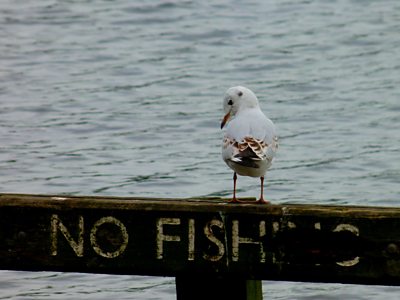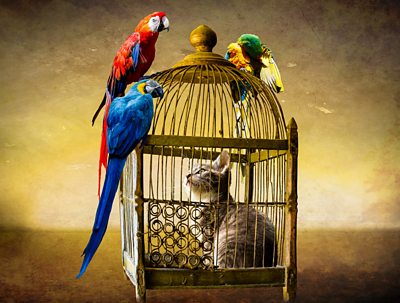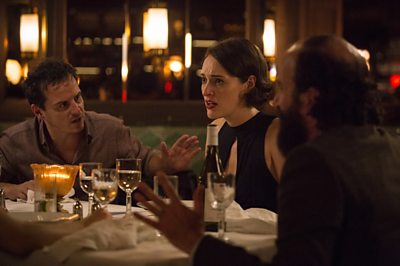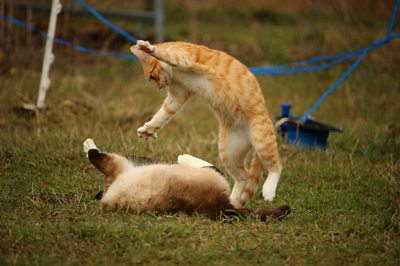So you’re writing a TV comedy drama script. Compared to a studio audience sitcom, you’re probably aiming for it to be more naturalistic in tone, less joke driven and for the action to be richer and truer to life. Maybe it’s personal, autobiographical, and you've got a story you’re burning to tell. Even better if it’s a world and characters you feel we haven’t seen on screen before.
Moreover, the kind of script you’re writing can go deeper and darker, or simply be truer and rawer, than traditional sitcom. But the danger is you might end up with something insufficiently dramatic or not funny enough – or both! That’s where this blog comes in, as I offer you techniques and approaches to pull off the comedy and the drama.
I am focusing here on thirty-minute scripts, which I like to think of as “comedy drama sitcom”. There would have been a time when this phrase would have made about as much sense as "oboe concerto pop song". But today so many brilliant shows invite the description, from Fleabag, Chewing Gum and Detectorists to Modern Family, Silicon Valley and Atlanta.
But if it’s longer form you’re writing, then all of the following will still be helpful – as indeed it will if you are at the other extreme and writing a comedy short (which can be a great sandpit to try out your characters and world, and a terrific pitching tool for the bigger idea if it happens to do well online or in film festivals). Now let’s turn to your comedy drama script and consider areas that set comedy drama writing apart.

With comedy drama, you the writer can have your own vision for the look and feel of the production.
It’s the production style of the show that first tells the audience we are in the comedic-dramatic space: the music, the single camera style of shooting, the atmosphere. Consider. the opening of the first episode of Ghosts, which I would term a ‘family comedy drama’. Despite the inherently comic premise, the subdued lighting, moody shots and plaintive piano music shout drama.
There is also room for real heart and pathos in the show. For example in the first episode, Fanny’s story of how her husband pushed her to her death from an upper storey window is sensitively played. There is real drama too when, in the present day, Alison ends up being pushed out of a window herself, in an echo of Fanny’s tragic death. The seriousness of her injuries, how it’s acted, shot and musically scored are all pure drama.
Alison gets taken to hospital in a suitably dramatic way, and in new comedy series Bloods, where Samson Kayo and Jane Horrocks star as odd-couple paramedic partners, the look and feel of the entire show is of a medical drama – stumbling across the show in the midst of one of the big, dramatic set-pieces with ambulances and helicopters, you’d certainly assume it was a Casualty type series, in a way you never would with a traditional sitcom that doesn’t have the resources or ambition to look like drama.
If you were writing a studio audience sitcom, it will inevitably have a staged feel with, in the studio, several cameras shooting at once, mostly from the front, and of course with the laughter of the live audience. This form has produced multiple classics, such as Fawlty Towers, Big Bang Theory, IT Crowd, The Young Ones, Friends and Blackadder (to randomly jump across eras and continents).
Back in the nineties, Caroline Aherne famously faced down the idea that The Royle Family should be a studio audience show in favour of its groundbreaking and hugely influential low-key naturalism. Perhaps you too thirst for a very ‘kitchen sink realist’ tone, or maybe you have a fast-paced and filmic vision like Edgar Wright, or an innovative approach like the POV of Peep Show. Of course, realising the look of the show will involve others but a passion for a particular look or feel can be an engaging talking point when pitching the project. And as you write, picturing the look, tone and atmosphere of the scenes you are penning can help with hitting that comedic and dramatic style.

Your comedy drama script can have a dramatic starting point.
Classic studio audience sitcom Blackadder Goes Forth has that powerfully moving ending to the sixth and final episode of the series. The characters leave their trench on the First World War battlefield, go over the top and run suicidally into the oncoming fire. Beautifully slowed down and with moving music (the edit brilliantly saving an unsatisfactory shoot on the day), it’s one of the most memorable moments in TV comedy.
In contrast to the three hours of broad sitcom that led up to it, it’s the stuff of comedy drama. But if it actually were a comedy drama series, rather than the end of the final episode, that scene could be the end of episode one. Then the rest of the series would be dealing with the fallout from going over the top (with a number of those characters now deceased and the remainder appallingly injured.)
In a comedy drama, that sequence could even be the start of episode one! Take for instance the opening of Flowers: depressed children’s author Maurice, stands on a chair, ties a noose to a tree, puts his head through it and jumps... Okay he survives, but only thanks to the branch snapping – at which he bathetically comments: ‘F**k’s sake’. (More on bathos below). Here is a show that is willing to start at his lowest, darkest point and develop the comedy from there.
A question I always ask writers I work with is this: what has happened before your script begins? The richer the events leading up to the opening of your script, then the stronger starting point you will have. Aim for the viewer to walk into a situation that’s a powder keg just waiting to be detonated; with lies, deceit, tragedy and grudges stretching back long before we meet the characters.

Your comedy drama script can take the audience to uncomfortable places.
In John Cleese’s wonderful, farcical movie A Fish Called Wanda, for reasons I won’t go into here, a series of blameless dogs are accidentally killed in botched attempts to bump off their owner. At one point a dog is squashed flat on a zebra crossing by a falling piano. On the day this scene was shot, the director and Ealing Comedy alumnus Charles Crichton announced he’d been shopping at the butchers. He then proceeded to arrange bloody entrails around the fake dead dog.
When the film was shown to a preview audience in a test screening, they were laughing happily… until they saw this shot of the bloody, squashed canine. Suddenly the laughs turned into shocked silence. Luckily a concerned crew member had ensured a safety shot had also been filmed without the gore. When the shot of the blood free, comically flattened dog was inserted instead, the subsequent preview audience gave it a huge laugh.
For the audience, actually feeling the shock and horror of the dog’s death got in the way of the laughter and so it had to be presented as a cartoon that wouldn’t arouse difficult emotions. There’s only so much reality a broad comedy can take. In Peep Show however when Jez reverses a Land Rover over a family’s beloved pet dog, the audience is invited to feel the horror of it all. When Mark and Jez, in an attempt to cover up the animal’s demise, burn the canine corpse in woodland, the dog on the fire is appalling realistic.
As you write your comedy drama, if you’re going somewhere dark, you can actually invite the audience to feel the horror of the situation. Your comedy drama can also take risks with the likeability of characters too, as Peep Show does here. Mark and Jez are hiding the truth from the family because Mark is hoping for employment from the father and Jez is hoping to sleep with the daughter; two ambitions that would be seriously compromised by the knowledge Jez had run over their beloved pet. The form is free to explore truly appalling behaviour with real consequences. Comedy drama can take a lot more reality.

Your comedy drama script can handle real and challenging emotions.
Continuing our death theme, in Funeral, the Mr Bean comedy short, Bean’s antics in the church include snogging the widow and play-acting that the deceased is in fact alive and is knocking on the inside of the coffin. The assembled mourners react in a nominally appropriate way – they are shocked - but not in a way that would detract from Mr Bean’s antics or in any way hinder him.
Mr Bean’s comedy is of course in a broad, live action cartoon style (indeed it was successfully translated into animation), but let’s consider how people would react if this were really happening. In real life, the congregation wouldn’t sit and let it all unfold, letting out the occasional gasp of horror. No, someone would manhandle him out of the church, he’d be in severe danger of being punched, and in the aftermath his mental health would surely be investigated. And this is how you’d want people to react in your comedy drama script.
Whereas a (brilliant) cartoon like Mr Bean simply could not function with genuinely truthful reactions, your comedy drama will thrive on real responses and emotions to inappropriate behaviour. But your comedy drama doesn’t need extreme and outrageous behaviour to create humour. Your comedy drama script can find laughs in simpler, well observed, flawed everyday behaviour. You can write about relatable bad behaviour rather than OTT craziness, aiming for laughs-of-recognition as you capture people’s true-to-life failings.
As a contrast to Mr Bean’s antics, consider the funeral sequence in Sharon Horgan and Rob Delaney’s brilliant comedy drama Catastrophe, when Sharon Morris’s father has died. It’s full of the comedy of people behaving badly – but it’s recognisable selfish, unaware or misjudged behaviour.
For instance, while her husband Rob Morris is in a white shirt and black tie, Sharon is aghast at her brother wearing a black turtle neck jumper; there’s a neat visual gag where Rob is far taller than the other pallbearers, unbalancing the coffin as they carry it; ex-partners Fran and Chris snipe at each other and Fran later tells Sharon that ‘I’m here for you’ and when Sharon opens her mouth to speak Fran turns and walks off; and Rob’s mother Mia (played by Carrie Fisher) tells Sharon’s elderly, respectable mother that a fellow mourner was trying to ‘get into her pants’.
And subsequently when Carrie Fisher died in real life, Sharon Horgan and Rob Delaney wrote the death of her character into the show in a touching, poignant and funny way. The death of Nana in The Royle Family is similarly moving, with actor Liz Smith commenting that her final performance as the character was the most emotionally draining of her career.
Comedy drama opens up the possibility to explore real emotion in this way. The traditional studio audience sitcom of course doesn’t preclude this, witness the many moving moments in Only Fools and Horses or indeed the aforementioned end to Blackadder Goes Forth, but the comedy drama form particularly invites it and will go there more readily.

You can find comedy and drama in your script with dramatic irony.
Dramatic irony is where the audience know something that character(s) don't. This is one of the main things that can create comedy and drama in your scenes and plot. If the audience and the characters all know the same things at the same time you are definitely missing a trick.
The classic example for teaching dramatic irony in drama is found in the ancient Greek Sophocles play, Oedipus Rex. Oedipus doesn’t realise the older woman he is sleeping with is the mother he was separated from at birth – but we the audience do: dramatic irony. In a comedic example from Fawlty Towers, Basil is chatting to a guest as he takes him breakfast in bed. What he doesn’t realise is that the guest has died in the night. The comedy comes from the fact that we the audience know he’s deceased while Basil doesn’t; again, dramatic irony. Fawlty Towers is in fact absolutely full of dramatic irony. it’s one of the main ways John Cleese and Connie Booth create comedy in their farcical scripts.
Turning to comedy drama, in the fifth episode of Atlanta, Earn is mistakenly identified by an agent as a colleague named Alonzo. As this mistaken identity grants him access to the closed-door agents’ cocktail hour he plays along and begins to revel in the perks of being an agent. We the audience know who he really is, but the agent doesn’t. Once again, it’s dramatic irony. This episode “Nobody Beats the Biebs” also includes a fictional Justin Bieber — who in a surreal twist exactly mirrors the actual Bieber, except that he’s black. In a sense it’s an unusual, dream like, example of dramatic irony in that we the audience know that Bieber is actually white but in the parallel world of the show the characters don’t.
In the opening episode of the second series of Fleabag, we find an extraordinary example of dramatic irony that is both comedic and dramatic. As the family meets for dinner with the priest who will marry Fleabag’s father and step-mother, her sister Claire has a miscarriage in the bathroom of the swanky restaurant. Fleabag knows what has happened (as do we the audience) but as they return to continue the meal, no one else around the table does.

Claire deals with the miscarriage by hiding it and throwing herself into loud and hedonistic enjoyment of the meal, grabbing a glass of wine despite hitherto being teetotal to aid becoming pregnant. Fleabag is in shock at the situation, but the rest of the assembled guests have no idea what’s going on and if anything are happy about Claire’s sudden levity.
This remarkable scene from Fleabag is certainly dramatic as the reality and sadness of the miscarriage is very much present. Then the comedy comes from how Fleabag responds to Claire’s denial of the situation. A reasonable approach to this appalling dilemma might be to create a space for Claire to share what has just happened to her. Or alternatively it might all remain unsaid, the unspoken truth weighing heavily on Claire, her sister and the audience. And this may well be what would happen in a serious drama.
But this is not what happens here. No, in order to break the silence on the subject, Fleabag says that she herself has miscarried in the bathroom. There is shock around the table. Claire looks at her WTF?! Fleabag is momentarily unsure – and then doubles down on her lie. (Note too how Fleabag pretends that she has miscarried as a misguided attempt to solve a problem: namely that the gravity of the situation is not being acknowledged. Characters attempting to solve problems but making things worse is at the heart of comedy.)
Dramatic irony then is a technique that can create drama or comedy – and can create both in the same scene. If you set up a serious situation where the audience know something that characters don’t, and then you have someone unskilfully or unwittingly reacting inappropriately or absurdly thereby undercutting the drama, this will bring comedy to it. Which brings us to our next technique, bathos.

Your comedy drama script will often find the funny within the drama through bathos.
In the fifth episode of the second series of Barry, the show about an aspiring actor turned hit man, there’s a scene that begins with Barry in a car with his handler. Barry has appalling wounds. He has clearly been viciously attacked. His handler, shocked and sympathetic, assumes Barry received these wounds at the hands of Ronny and his formidable taekwondo skills. But Barry reveals he actually received the vicous beating at the hands of Ronny’s middle-school-age daughter Lily. This is bathos. The idea of a beating by a powerful grown man is suddenly undercut by the revelation that is a child who was responsible.
With bathos, you build it up and then knock it down, as we saw earlier with Maurice’s thwarted suicide attempt in Flowers - the drama of the situation is undercut by the branch snapping and Maurice’s prosaic exclamation, ‘F**k’s sake’ (as if he’s just suffered a mundane annoyance like his printer getting jammed). Bathos is an abrupt change in mood or tone from the dramatic to the trivial, from the serious to the absurd, or from the refined to the crude. To put it simply, it’s going from big to small. It’s at the heart of comedy drama and is one of the techniques you will draw on most to find the comedy in the drama.
There’s also a huge amount of bathos in Ghosts. Early on in the first episode, Alison and Mike drive up to the property, and Alison goes into a speech about how this house she has inherited is uncannily familiar, as if she's known it all her life... then they realise it's the wrong house. And when Fanny tells the tragic story of her death at the hands of her husband who pushed her out of the window, a story she has kept a closely guarded secret in all the years since her death, it’s played straight – and is then immediately undercut by all the ghosts who died before her saying they already knew as they’d seen it happen.
As well as being a sudden change of tone, bathos can also be created when something serious is going on and is simultaneously undercut by the presence of something absurd or trivial. In this case, the big is undercut by the presence of the small. Turning to the final scene in the first series of Fleabag, Fleabag is at her lowest, she is self-loathing, she has ruined her life and the lives of those she cares about. But where is this scene playing out? It’s taking place in a guinea pig cafe; with cute pictures of all the little pet rodents on the walls. The very fact of the guinea pig cafe is an important ongoing undercutting of the big issues.
Imagine if this were a serious drama. We can easily picture the script editor saying, ‘this guinea pig cafe just feels too frivolous – it’s detracting from the drama. Make it a normal cafe.’ In comedy drama, the thing that feels too frivolous or daft, the thing that is jarring set against the drama, is the very thing you want for comedy.

Another aspect of bathos then, is where a dramatic scene takes place. Bathos can be created where serious or dramatic action is undercut by taking place somewhere that is inherently absurd or comical, thereby creating a bathetic friction between what is happening and where it’s happening. We see another example of this kind of bathos in �鶹Լ��, where where Syrian asylum seeker Sami has, in his desperation, taken a hostage… in the sauna at a chi-chi spa. The police officer notes that they are holding back initially as they are seeking to respect the energy flow of the spa.
So as you write your script, do lean into the dramatic moments – and then enjoy undercutting them. Imagine, for example, that in your script a family secret is at last being shared by a father to his son… on the dodgems at a fairground. You can also create a similar effect by what someone is wearing – for example when delivering a moving speech they happen to be dressed as a unicorn for a fancy dress party. Or they may be similarly undermined by a prop. For example, needing to fight off an intruder with a toy sword.
And more simply, characters' childish or ridiculous behaviour can similarly undercut a dramatic moment. In the Barry scene I describe above (where incidentally, in an absurd simile that serves to undercut the drama, the terrifying girl is described as being like ‘a feral mongoose’), when the hit man and his handler go off to take out the child, a shocking course of action, the heaviness of the moment is undercut by their ridiculous squabbling and terrible driving. Similarly as Mark and Jez burn the dog corpse in Peep Show, a truly appalling and bleak moment, they similarly undercut the drama with childish squabbling. ‘Gallows humour’ also creates bathos; where characters in a dark, tragic or grim moment, knowingly undercut it with ironic humour.

Your comedy drama script writing involves a playful tussle between your serious and comic sides.
When writing comedy drama then, you need the writing skills to pull off the actual drama… then the mischievous inclination to keep on undercutting it. It’s almost like there are two of you – the serious writer who crafts the dramatic situations and the naughty writer who keeps undermining the serious work. It’s as if you are both the teacher and the naughty kid at the back of the class. Both of these sides of yourself need to be fully engaged in order to write your brilliant comedy drama script.
